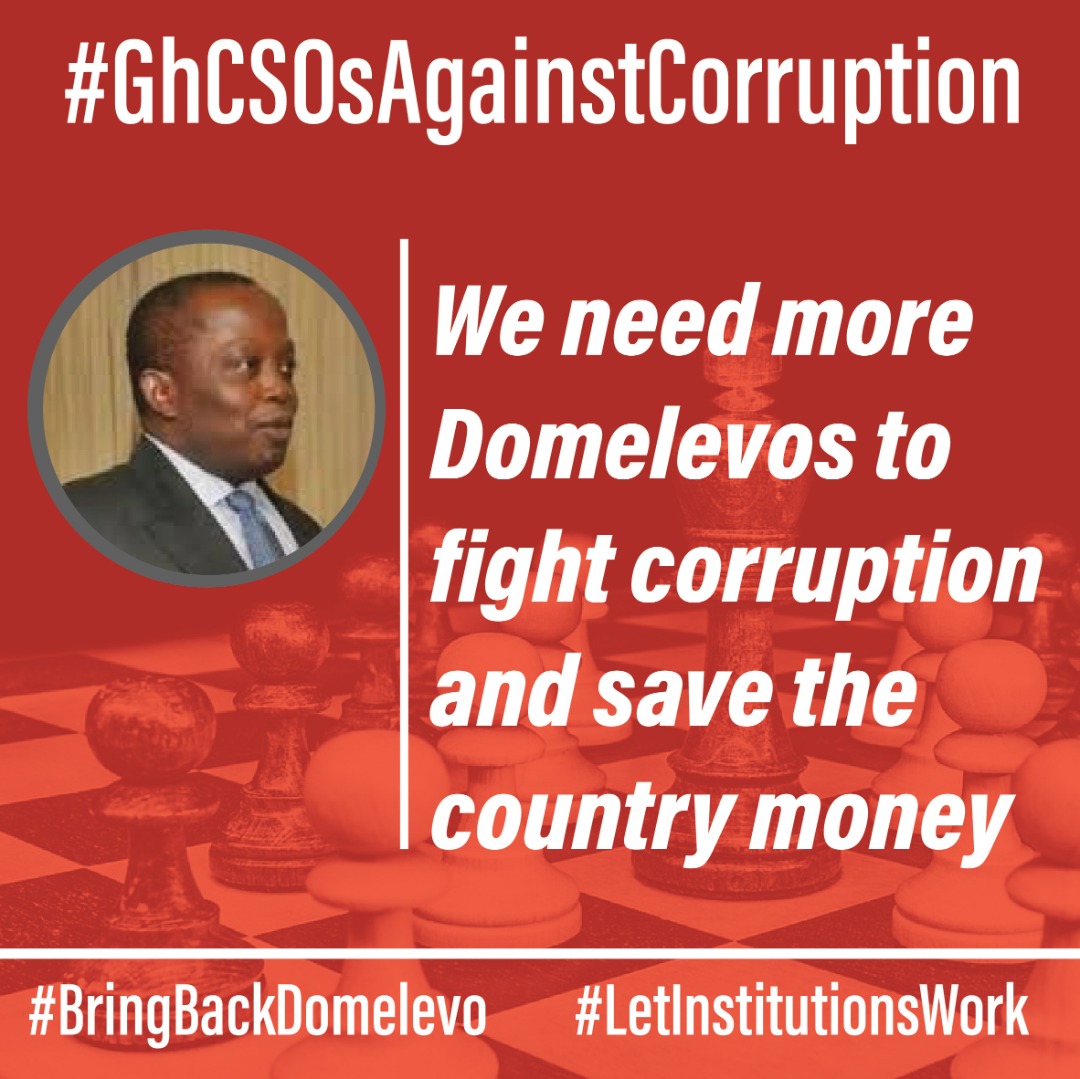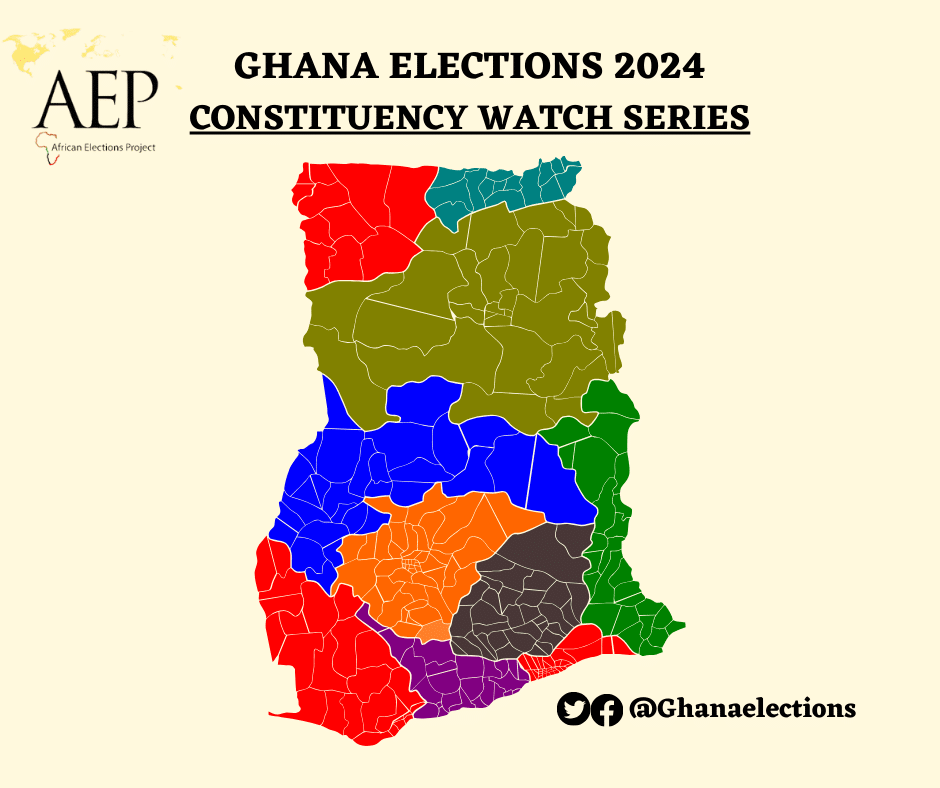Dated: 7th July 2020
It is with sadness, disappointment and extreme concern that we come to you today to share our thoughts on the decision of the President on 24th June 2020, last Monday, to direct the Auditor General, Mr. Daniel Domelevo to take his accumulated leave of 123 days beginning 1st July 2020. The Auditor General has subsequently been directed to add his annual leave for 2020, bringing the total leave days to 167. We find the entire episode and the justification for the action taken as regrettable and inconsistent with both the spirit and the letter of the 1992 Constitution. In our estimation these actions only weaken our quest for good democratic governance grounded on checks and balances, rule of law and the pursuit of public accountability.
In the evening of Monday 29th June 2020, news started filtering in that the President Nana Addo Dankwa Akuffo Addo had directed the Auditor General to take his accumulated leave of 123 days effective July 1st 2020. The statement stated that the President has based his decision on Sections 20(1) and 31 of the Labour Act 2003 (Act 651). These provisions basically provide for a 15 day leave entitlement for worker in a calendar year. Further, a worker and employee cannot agree to forgo a leave entitlement. Mr. Domelevo was said to have taken 9 out of a possible 132 days since his appointment in 2016. To apparently strengthen the justification for such an action, the statement referred to a similar decision taken by the late President Mills in 2009 during the tenure of Mr. Dua Agyeman, the current Board Chair of the Ghana Audit Service. On the 3rd of July, the Auditor General responded to the President’s directive challenging the legal basis for the decision and expressing concern with what he considers to be an effort to interfere with his constitutional mandate. The same day the Presidency followed up with a reply restating and expanding on its legal justifications. All the communication from the Presidency to the AG and vice versa have been shared with the public.
Ladies and Gentlemen, context matters in discussing these issues. It is important to note that this current issue with the Auditor General is not an isolated event but part of an ongoing tussle between the Auditor General and the Audit Service Board led by its Chairman Mr. Dua Agyemang, a former Auditor General himself, over the confines of the Auditor General’s constitutional independence. The Board’s efforts to subjugate the Auditor General under its control has led to several clashes including a matter in 2017 over the purchase of vehicles for the Audit Service which is now a subject of an EOCO investigation. There was an attempt to resolve the impasse through a Committee set up by the President and led by the President’s Secretary but it was not successful. Mr. Isaac Wilberforce Mensah has taken the constitutional matters raised by the Board to the Supreme Court for interpretation. It is therefore not a surprise that the Board Chairman is reported to have confirmed on several media platforms that it is the Board that referred the matter about the accumulated leave to the President. This context indicates that at the heart of the matter is the independence of the Auditor General and that is what we should pay attention to.
Threats to the Independence of the Auditor General and other Independent Governance institutions
First, the action of the President on the face of it may be grounded in law, however
when the decision is examined in the context of the 1992 Constitution, particularly in relation to the independence of the Auditor General, it operates to interfere with the mandate of the Auditor General.
The framers of the 1992 Constitution could not have intended to create a simple employer and employee relationship between the appointing authority, in this case the President, and the Auditor General thereby making the President a Human Resource Manager, administering the leave schedule of heads of Independent Governance Institutions. If this understanding is accepted then it means that the President can direct the Chief Justice, the Commissioners of the Electoral Commission and the Commissioners of the Commission for Human Rights and Administrative Justice (CHRAJ) to proceed on leave when he sees fit. That would be an absurdity and will operate to interfere with the independence of that office. If this logic was to be extended then it means the President can presumably direct the Auditor General as to which international conference he can and cannot attend, a matter which ordinarily would be managed as an HR function. Just imagine a situation where a President ask the Chair of the Electoral Commission to go on leave in the middle of her preparations for the voter registration. In a context like that, a fair-minded person is likely to believe that the President is not acting in good faith.
The second letter from the Presidency raises an even more serious constitutional question as to whether or not the President as the appointing authority has the power to apply administrative sanctions against heads of independent governance institutions. In essence, whether the President can suspend the Auditor General or a Chief Justice for insubordination. As democrats, we should heed the warning from what has happened recently in other African jurisdictions. Just last month, a similar incident occurred in Malawi, when the President directed the Chief Justice Andrew Nyirenda to take his accumulated leave ahead of his retirement. The Malawi Law Society and the Association of Magistrates and others sought an injunction in court to stop the President’s order from being carried out. They believed the President was interfering with the independence of the Judiciary.
Fair and Equal Application of the Law
Second, for argument sake, lets accept that the President acted properly in this matter, yet still the selective application of government’s HR policy weakens the propriety of the decision. The 2nd letter from the Presidency provides further elaboration on the legal justification for the decision. If leave is mandatory and should be taken by all officers is this being enforced at all levels of the public and civil services or the Auditor General is a special case? Is government saying that it is now implementing a policy of ensuring that all public officers take their mandatory and accumulated leave? The second letter suggest that the action by the President is a disciplinary action following repeated prompting from the Board for him to take his leave. If that is the case, it will be good for the President to issue similar directives to all heads in the public and civil services with clear timelines for when this should take effect and to take disciplinary action against all who fail to comply. Without applying this action to other public officers, we are left with little option but to conclude the Auditor General is being unfairly targeted. A proper adherence to the rule of law also implies a commitment to apply laws equally and fairly.
Handling Annual Leave as an HR Function
Third, it is curious that a small matter of managing annual leave has escalated to this level. This is unfortunate but as we stated earlier, the context shows that the administration of leave has been added to the basket of actions and inactions being contested by the Audit Service Board. In our view leave entitlements and schedules are a purely HR function handled within an organization. For many public and private institutions this is handled by an HR manager and often does not lead to directing a person to forcibly take their leave. Most managers at the highest levels hardly exhaust their leave and if they omit to take their leave even when offered, they lose it and not accumulate it. Therefore, it is disappointing that the President only choose one option once this matter was brought to his attention. For an Auditor General who the President has praised on several occasions for his dedication to work, the President could only see the option of dispensing with his services for six whole months. The President could have taken the view that the entitlement extinguishes each year as long as the AG freely chose not to take it even at the prompting of the employer. The President could have decided to ask him to take some of his 2020 leave. These are all options that recognizes the importance and independence of the Office. None of these were done. In fact, at the time the Auditor General was receiving the letter from Jubilee House, it was already in the media that he has been asked to proceed on leave. A curious issue is why the Presidency did not force the Auditor General to take his mandatory leave in 2017, 2018 and 2019 if it had been aware of these complaints by the Board or why was the Auditor General not asked to take his leave from next year ahead of his retirement? That is if the Mills precedent was being followed. On the whole there were other options to would have mitigated any potential interference with the work of the Auditor General and none were taken.
Citizens should support and protect the independence of the Auditor General and his Office
Fourth, we as citizens have to fight for public officers like Mr. Domelevo, not because they are saints and infallible but that they show us that the governance and society we clamour for is possible. We wake up each day complaining about the problems of leadership and the public service. We complain about the lack of accountability, sacrifice, leadership example and effectiveness in the way the public sector is managed. Since Mr. Domelevo took office, he has been exemplary, shown leadership and have been extremely productive. His achievements are there for all to see. We need more of such men and women and there are many who have to fight this fight alone and often they lose out. This action is a warning and a huge discouragement to public office holders who desire to stand up and be counted. It is shocking to read in some media reports that Mr. Domelevo is serving a political party interest by his actions. This is the same Auditor General who upon assumption of new NPP government in 2017 conducted an audit of liabilities of Ministries, Departments and Agencies accrued in 2016 during the tenure of the President who appointed him and disallowed as much as 5.4 Billion Ghana Cedis, saving the country a lot of money. As citizens, we have to make a choice whether we want an Auditor General who will hold everyone to account without fear or favor, who will ensure our hard-earned taxpayer’s money is used for the benefit of citizens and not go to individual pockets. If that is what we want then we must stand up and make our voices heard. This is not an NPP or NDC matter, this is about Ghana, whether it is an NPP or NDC government, we want an independent Auditor General. When, we get people like Mr. Domelevo who wants to work and serve the public interest, we must protect them.
Remedial Action
Ladies and gentlemen, based on the issues we have raised in reaction to the President’s actions, first, we believe the decision of the President is not proper and needs to be reconsidered. In this regard, we are calling all well-meaning Ghanaians to join us in our campaign to #Bring-Domelevo-Back beginning today. Second, if the President insists on the propriety of his decision then we call on him to apply the same policy to all heads of civil and public services of Ghana. Third, as a result of the gravity of the constitutional issues raised by this action, we are considering applying to Supreme Court for interpretation of the President’s powers in respect of independent governance institutions. Fourth, we are fully aware that one of the issues that deepened the conflict between the Auditor General and the Board is the Kroll Associates case, we will all be watching closely how the matter is being handled in the temporary absence of the Auditor General. We are aware per the Supreme Court’s instructions the documents requested by the Auditor General has now been inspected and the parties are due to return to court, we will follow the process closely. Lastly, it is important to acknowledge the diligent work of the Audit Service for many years. It has been one of the performing public institutions over the years. Mr. Domelevo’s leadership has taken it to another level. It is our expectation that the Service will continue to serve the public with distinction and professionalism in the temporary absence of the Auditor General.
God bless Ghana!!






